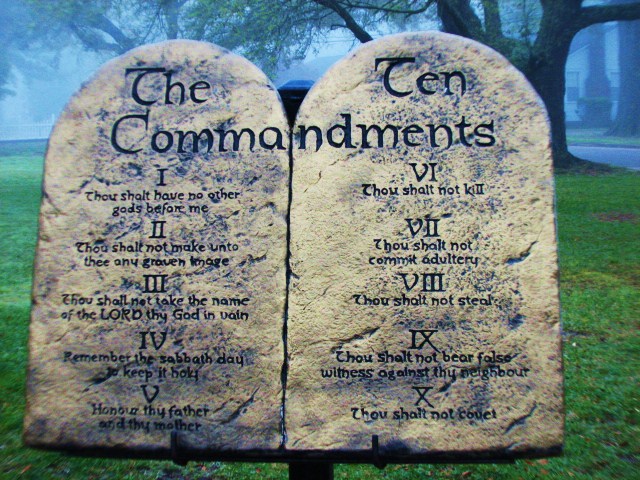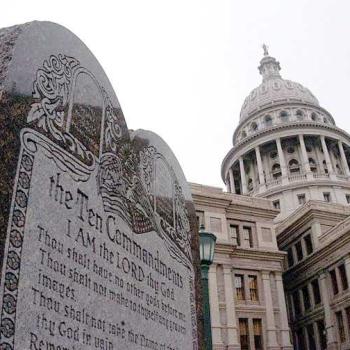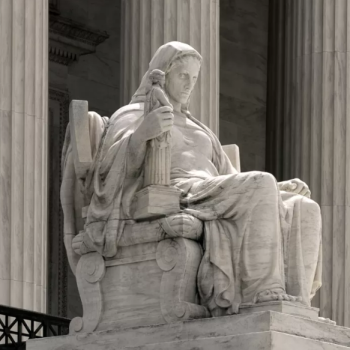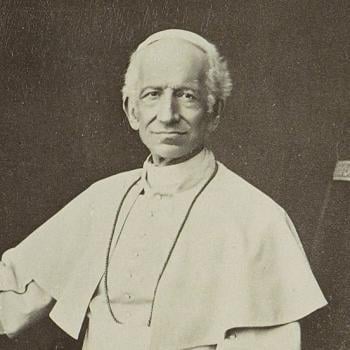The Louisiana legislature just passed a bill mandating the display of the Ten Commandments in all public school classrooms. And this one is very close to becoming law. Texas attempted such a thing last year, but the bill passed by the Texas Senate died in the Texas House. Similar bills were introduced in South Carolina and Utah but have not yet become laws. At the moment, however, it appears the Louisiana bill will go all the way to being signed by the governor.
Note that none of these bills differs significantly from one passed in Kentucky in 1978 and declared unconstitutional by the U.S. Supreme Court in 1980. The current Supreme Court, however, seems to think a little establishment of religion never hurt anybody. James Madison, the chief author of the Bill of Rights, would no doubt disagree. The current conservative justices like to call themselves “originalists,” meaning they claim to interpret the Constitution to mean what the authors intended it to mean. But the justices can be remarkably creative in deciding what the authors meant.
The Louisiana bill mandates the text of the Ten Commandments to be used, which appears to be an abridged version of Exodus 20:1-17 from the King James Bible, with all the “thees” and “thous” intact. Just so we’re all clear, the classroom display must begin with the words “I AM the LORD thy God.” The Commandments must be printed on a poster or framed print no smaller than eleven by fourteen inches in a large, easily readable font. And it must be prominenetly displayed in every classroom and every building in every school in Louisiana that receives public funding, including universities.
Why This Is Happening
The last post discussed why it’s hard to separate church and state. There’s no question that Christianity has been the overhwhelmingly dominant religion in the U.S. since the beginning of the U.S. Even so, recorded history tells us that the founders of the nation deliberately created a secular government that could not be used by any religious faction to enforce its own beliefs and practices. But from the beginning many Americans simply refused to accept a secular government. Soon a myth of a “Christian nation” arose. According to this myth, the founders must have intended to give Christianity a privileged place in American government. Maybe they just forgot to say so.
Parallel to the “Christian nation” myth is the myth that the Ten Commandments are the basis of all laws, including American law, and this is why we must display the Ten Commandments in schools and courthouses and all over the place generally. But as history, this claim is pure bunk; see “The Ten Commandments and the Origins of Law.” There is no question the Ten Commandments are signifiant to the Abrahamic religions. But they were probably at least partily cribbed from the Code of Hammurabi. The laws of the United States had origins in English Common Law, and if you keep digging you can find roots in Viking law and the laws of the Roman Empire and lots of other early law codes. The Ten Commandments seriously had no special place in the origins of U.S. law.
We’re still fighting this fight over separation of church and state because some of America’s Christians cannot accept not being the dominant tribe. In recent decades the percentage of Americans who self-identify as Christian has been in significant decline. The Pew Research Center is predicting that the percentage of Christians in the U.S. could fall below 50 percent within a few decades. Some U.S. Christians find this unacceptable, even terrifying, and they are fighting back. So monuments to the Ten Commandments must be erected everywhere as Christian tribal totems, and public schools must be used to indoctrinate children into Christianity as much as possible. Several states are even considering bills that would replace school guidance counselors with Christian chaplains.
What the Founders Intended
The men who founded the United States and authored the Constitution didn’t see eye to eye on everything, certainly. But they did give us a Constitution that made no mention of God and forbade any sort of religious test for public office. This was not an oversight; it was intentional. Europe had suffered a couple of centuries of brutal warfare as religious factions fought over the power and privileges to be gained if their prince could be placed on the throne. By denying government the power to establish state religions or favor one religion over another, the founders hoped to avoid something similar happening in the U.S.
James Madison wrote, “Because if Religion be exempt from the authority of the Society at large, still less can it be subject to that of the Legislative Body.” In other words, the government must be constrained from encroaching on matters of personal conscience, like religion. “The Rulers who are guilty of such an encroachment exceed the commission from which they derive their authority, and are Tyrants. The People who submit to it are governed by laws made neither by themselves nor by an authority derived from them, and are slaves.”
Further, Madison said, “Who does not see that the same authority which can establish Christianity, in exclusion of all other Religions, may establish with the same ease any particular sect of Christians, in exclusion of all other Sects?” For that matter, the sect that excludes all other sects some day may not be Christian. Beware of unintended but possible consequences.














